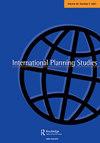A comparative assessment of local municipal food policy integration in the Netherlands
IF 1.5
Q4 REGIONAL & URBAN PLANNING
引用次数: 21
Abstract
ABSTRACT Local governments around the world increasingly engage in food governance, aiming to address food system challenges such as obesity, food waste, or food insecurity. However, the extent to which municipalities have actually integrated food across their policies remains unknown. This study addresses this question by conducting a medium-n systematic content analysis of local food policy outputs of 31 Dutch municipalities. Policy outputs were coded for the food goals and instruments adopted by local governments. Our analysis shows that most municipalities integrate food to a limited extent only, predominantly addressing health and local food production or consumption. Furthermore, municipalities seem hesitant to use coercive instruments and predominantly employ informative and organizational instruments. Nonetheless, a small number of municipalities have developed more holistic approaches to address food challenges. These cities may prove to be a leading group in the development of system-based approaches in Dutch local food policy.荷兰地方市政食品政策一体化的比较评估
摘要世界各地的地方政府越来越多地参与粮食治理,旨在应对肥胖、食物浪费或粮食不安全等粮食系统挑战。然而,市政当局在多大程度上实际将粮食纳入其政策仍不得而知。本研究通过对荷兰31个城市的地方粮食政策产出进行中系统的内容分析来解决这个问题。政策产出是为地方政府通过的粮食目标和文书编码的。我们的分析表明,大多数城市只在有限的程度上整合了食品,主要涉及健康和当地食品生产或消费。此外,市政当局似乎对使用强制性文书犹豫不决,主要使用信息性和组织性文书。尽管如此,少数城市已经制定了更全面的方法来应对粮食挑战。这些城市可能被证明是荷兰地方粮食政策中基于系统的方法发展的领先群体。
本文章由计算机程序翻译,如有差异,请以英文原文为准。
求助全文
约1分钟内获得全文
求助全文
来源期刊

International Planning Studies
REGIONAL & URBAN PLANNING-
CiteScore
4.60
自引率
4.80%
发文量
20
期刊介绍:
Planning, at urban, regional, national and international levels, faces new challenges, notably those related to the growth of globalisation as both an objective socio-economic process and a shift in policy-maker perceptions and modes of analysis. International Planning Studies (IPS) addresses these issues by publishing quality research in a variety of specific fields and from a range of theoretical and normative perspectives, which helps improve understanding of the actual and potential role of planning and planners in this context.
 求助内容:
求助内容: 应助结果提醒方式:
应助结果提醒方式:


